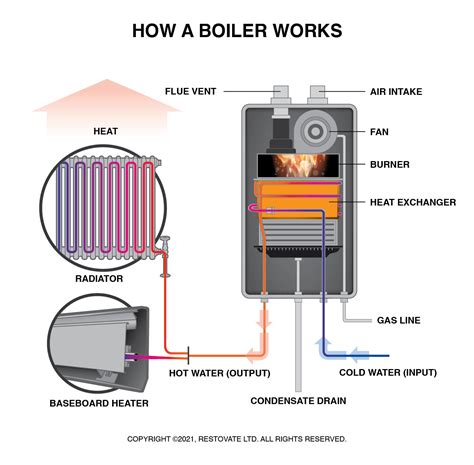How Do Boiler Heating Systems Work
Ronan Farrow
Mar 20, 2025 · 3 min read

Table of Contents
How Do Boiler Heating Systems Work? A Comprehensive Guide
Boilers are the heart of many home heating systems, providing warmth and hot water. Understanding how they function is key to maintaining a comfortable and efficient home. This comprehensive guide will delve into the mechanics of boiler heating systems, explaining their components and operation in detail.
The Core Components of a Boiler Heating System
A typical boiler heating system comprises several key components working in synergy:
1. The Boiler Itself: The Engine of Your Heating System
The boiler is the central unit responsible for heating water. Different types exist, including:
- Combustion Boilers: These boilers burn fuel (natural gas, propane, oil) to heat water. The heat transfer is usually through a heat exchanger.
- Electric Boilers: These use electricity to heat water directly, often considered more environmentally friendly but potentially more expensive to operate.
Understanding the Heat Exchanger: This crucial component facilitates heat transfer from the burning fuel or electricity to the water. Efficient heat exchangers are vital for energy efficiency.
2. The Circulator Pump: Distributing the Heat
Once the water is heated, a circulator pump pushes it through the system's pipes to radiators or underfloor heating systems. This pump ensures that heated water reaches every corner of your home.
3. Radiators or Underfloor Heating: The Heat Delivery System
- Radiators: These are familiar metal units that radiate heat into the room. They are a common and effective method of space heating.
- Underfloor Heating: This system involves pipes embedded in the floor, distributing gentle, even heat throughout a room. It's known for its comfort and energy efficiency in some cases.
4. Expansion Tank: Managing Pressure Changes
As water heats, it expands. An expansion tank absorbs this expansion, preventing excessive pressure buildup that could damage the system.
5. Pressure Relief Valve: A Safety Net
The pressure relief valve acts as a safety mechanism, releasing excess pressure should it exceed a safe level. This prevents potentially hazardous situations.
6. Thermostat: Controlling the Temperature
The thermostat allows you to control the boiler's operation, setting your desired temperature. Modern thermostats often offer programmable options for greater energy savings.
How the System Works: A Step-by-Step Explanation
-
Fuel Ignition/Electricity Supply: The process begins with the ignition of fuel (in combustion boilers) or the activation of the heating element (in electric boilers).
-
Water Heating: The heat generated warms the water within the boiler.
-
Circulation: The circulator pump begins to circulate the heated water through the pipes.
-
Heat Distribution: The heated water reaches radiators or underfloor heating systems, releasing heat into the rooms.
-
Cooling and Return: As the water cools, it returns to the boiler to be reheated, creating a continuous cycle.
-
Temperature Regulation: The thermostat monitors the temperature and turns the boiler on or off to maintain the set temperature.
Maintaining Your Boiler Heating System for Optimal Performance
Regular maintenance is crucial for ensuring efficient and safe operation. This includes:
- Annual Servicing: A professional service will identify and address potential issues before they escalate.
- Bleeding Radiators: Air trapped in radiators reduces their efficiency. Bleeding them removes the air, improving performance.
- Checking Pressure: Regularly check the system pressure to ensure it's within the manufacturer's recommended range.
By understanding the workings of your boiler heating system, you can better appreciate its importance and take steps to ensure its long-term efficiency and reliability. Remember that consulting a qualified professional for installation and maintenance is always recommended.
Featured Posts
Also read the following articles
| Article Title | Date |
|---|---|
| How Does Getting Married Affect Child Support In New York | Mar 20, 2025 |
| How To Wash White Coat | Mar 20, 2025 |
| How Can You Tell If A Pool Table Is Slate | Mar 20, 2025 |
| How Can I Stop A Sheriff Sale On My Home | Mar 20, 2025 |
| How Do You Get A Squirrel Out Of Your Chimney | Mar 20, 2025 |
Latest Posts
Thank you for visiting our website which covers about How Do Boiler Heating Systems Work . We hope the information provided has been useful to you. Feel free to contact us if you have any questions or need further assistance. See you next time and don't miss to bookmark.
